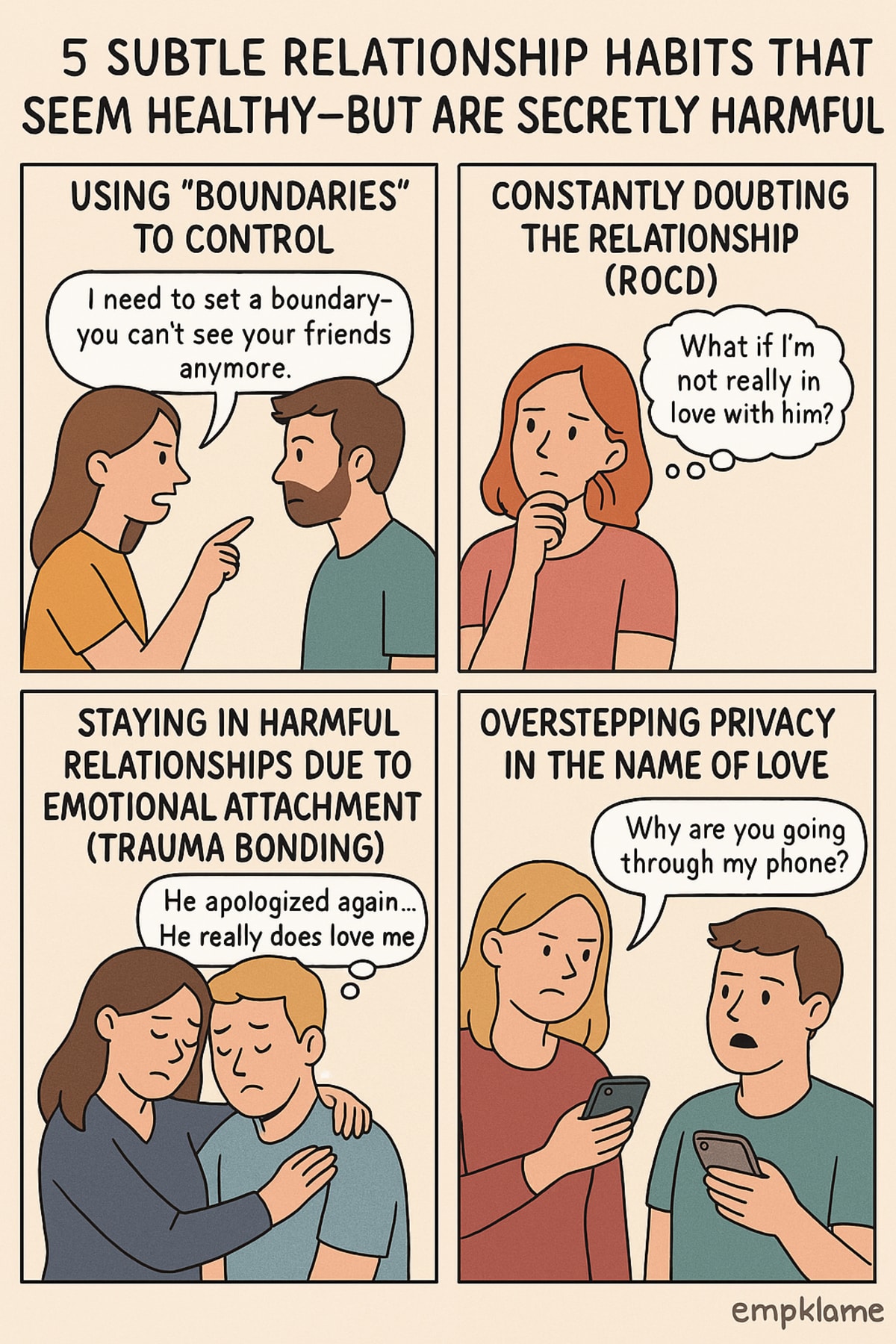Many couples strive to build healthier relationships in today's world, where emotional intelligence and self-awareness are highly valued. However, some behaviors, cloaked in the language of personal growth and psychological insight, can inadvertently foster toxicity. Let's explore five such habits that, while seemingly benign, can undermine the foundation of a healthy partnership.
1. Using 'Boundaries' to Control
What It Looks Like:
Setting personal boundaries is essential for self-care and mutual respect. However, when limits are imposed to control a partner's actions—like dictating who they can see or what they can post online—they cross into manipulation. Proper boundaries are about expressing your needs and limits, not controlling others.
How to Recognize It:
- Are the boundaries one-sided, benefiting only one partner?
- Do they restrict your partner's autonomy under the guise of self-care?
- Is there a lack of mutual agreement on these boundaries?
What to Do:
Reflect on whether your boundaries are about your needs or controlling your partner's behavior. Open communication is key—discuss your feelings and reach mutual agreements.
2. Constantly Doubting the Relationship (ROCD)
What It Looks Like:
It's normal to have occasional doubts in a relationship. However, if you find yourself obsessively questioning your feelings or your partner's suitability, you might be experiencing Relationship Obsessive-Compulsive Disorder (ROCD). This can lead to anxiety and strain on the relationship.
How to Recognize It:
- Do you frequently seek reassurance about your relationship?
- Are you overanalyzing your partner's flaws or the relationship's imperfections?
- Do these thoughts cause significant anxiety or distress?
What to Do:
Recognize these patterns and consider seeking professional help. Therapies like Cognitive Behavioral Therapy (CBT) can be effective in managing ROCD symptoms.
3. Staying in Harmful Relationships Due to Emotional Attachment (Trauma Bonding)
What It Looks Like:
Sometimes, individuals remain in abusive relationships because of a deep emotional attachment formed through cycles of abuse and reconciliation—a phenomenon known as trauma bonding. This bond can make it challenging to leave despite the harm being caused.
How to Recognize It:
- Are you experiencing repeated patterns of abuse followed by reconciliation?
- Do you feel unable to leave the relationship despite ongoing harm?
- Are you making excuses for your partner's harmful behavior?
What to Do:
Acknowledge the situation and seek support from trusted friends, family, or professionals. Therapy can help you understand the bond and develop strategies to break free.
4. Overstepping Privacy in the Name of Love (Obsessive Relational Intrusion)
What It Looks Like:
Acts like constantly checking your partner's phone, showing up uninvited, or incessantly messaging can feel like expressions of love but maybe forms of Obsessive Relational Intrusion (ORI). Such behaviors can infringe on personal space and autonomy.
How to Recognize It:
- Are you engaging in unwanted, persistent contact, such as excessive texting or showing up uninvited?
- Are you tracking your partner's activities or whereabouts without consent?
- Are you ignoring your partner's requests for space or privacy?
What to Do:
Evaluate your actions and their impact on your partner's sense of privacy. Fostering trust and open communication is more effective than surveillance.
5. Misusing Therapy Language to Avoid Responsibility
What It Looks Like:
Terms like 'gaslighting,' 'narcissist,' or 'triggered' have become common in everyday conversations. While understanding these concepts is valuable, misusing them to label or blame partners can hinder genuine communication and personal accountability.
How to Recognize It:
- Are you frequently using psychological terms to describe everyday behaviors?
- Are you using these terms to avoid accountability or to blame your partner?
- Are you dismissing your partner's emotions by labeling them with clinical terms?
What to Do:
Use language to express your feelings and experiences rather than to diagnose or blame. Focus on 'I' statements to convey your perspective without casting judgment.
Conclusion
Recognizing and addressing these behaviors can lead to healthier, more fulfilling relationships. It's about fostering mutual respect, understanding, and open communication. If you identify with any of these patterns, consider seeking support from a mental health professional to explore these dynamics further.
